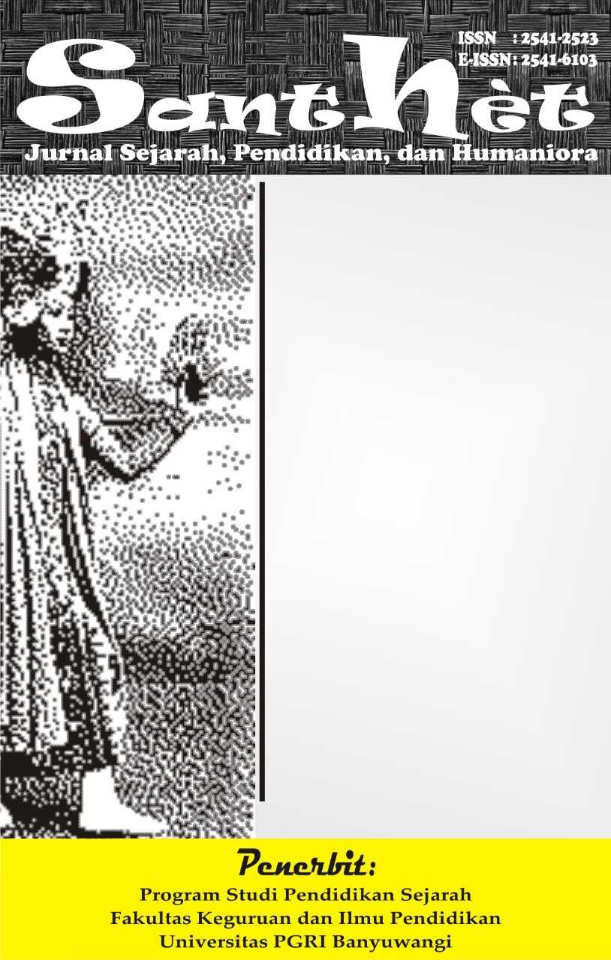Ecological Sin and Its Impact on Environmental Crisis: A Case Study of Landslides and Floods in Kali Village, Minahasa
DOI:
https://doi.org/10.36526/santhet.v9i5.6136Keywords:
Ecological Sin, Environmental Crisis, Landslides, Flood, Kali VillageAbstract
This study investigates the interconnection between ecological sin and environmental crisis in Kali Village, Minahasa, where recurring landslides and flooding are symptoms of deeper moral, spiritual, and structural failures. Despite the growing environmental degradation driven by deforestation, unsustainable land conversion, and waste mismanagement, community and ecclesial awareness of ecological responsibility remains limited. Drawing on qualitative case study methods, the research employed in-depth interviews, focus group discussions, field observations, and document analysis with 30 participants, including church leaders, congregants, local residents, and environmental activists. Thematic analysis revealed that environmental destruction is not merely a technical issue but a manifestation of extractive capitalism, weak local governance, and disconnection between Christian doctrine and ecological practice. While the Church holds significant moral authority, its response has largely been charitable and reactive, failing to address systemic injustices or integrate ecological sin into theological teaching. Many congregants perceive environmental harm as an economic necessity rather than a spiritual transgression, reflecting their fragmented understanding of stewardship. The study further identifies a critical gap between the church’s potential as a transformative agent and its current inaction, particularly in advocating policy change or empowering communities through ecological education. The findings underscore that ecological degradation is inseparable from social injustice, where vulnerable groups bear the brunt of decisions made by external actors and indifferent institutions. The research concludes that a theological reframing is urgently needed one that redefines the church’s mission as intrinsically ecological. To be credible, the church must move beyond symbolic stewardship and embrace a prophetic and participatory role in environmental restoration, grounding its mission in justice, accountability, and creation care.
References
Amalia, R., Dharmawan, A. H., Prasetyo, L. B., & Pacheco, P. (2019). Perubahan tutupan lahan akibat ekspansi perkebunan kelapa sawit: Dampak sosial, ekonomi dan ekologi. Jurnal Ilmu Lingkungan, 17(1), 130–139.
Arauf, M. A. (2021). Ecological view from the perspective of quranic verses: Contesting the idea of religion and environment. International Journal of Social Science and Religion (IJSSR), 105–116.
Gosal, R. C., Komaling, O. N., Burhan, V. E., & Runtuwene, H. C. M. (2023). Pemahaman Warga Jemaat GMIM Immanuel Taratara Terhadap Peran Gereja Masa Kini: Sebuah Kajian Kualitatif. Rhapsodi Jurnal Studi Multidisiplin, 1(3), 130–144.
Harianto, D., Yansen, Y., Suhartoyo, H., Barchia, M. F., & Anwar, G. (2022). Laju Perubahan Penutupan Lahan dan Faktor-Faktor Yang Mendorong Perambahan Kawasan Hutan Bukit Balai Wilayah Pengelolaan UPTD KPH Wilayah XI Kikim-Pasemah Dinas Kehutanan Provinsi Sumatera Selatan. Naturalis: Jurnal Penelitian Pengelolaan Sumberdaya Alam Dan Lingkungan, 11(2), 194–198.
Hasan, H. (2022). Islam and ecological sustainability: An exploration into Prophet’s perspective on environment. Social Science Journal for Advanced Research ISSN (Online), 74–2583.
Kusuma, K., Widodo, P., & Wilopo, W. (2023). PENDEKATAN RELIGIUSITAS UNTUK MENCEGAH ANCAMAN KERUSAKAN LINGKUNGAN. NUSANTARA: Jurnal Ilmu Pengetahuan Sosial, 10(7), 3482–3492.
Manguju, Y. N. (2022). Membangun Kesadaran Sebagai Manusia Spiritual-Ekologis Dalam Menghadapi Krisis Ekologi Di Toraja. SOPHIA: Jurnal Teologi Dan Pendidikan Kristen, 3(1), 29–49.
Manik, J. I., & Rambe, M. I. I. (2024). Implementasi prinsip-prinsip hukum lingkungan dalam pengelolaan sumber daya alam di Indonesia. Innovative: Journal Of Social Science Research, 4(4), 8220–8229.
Marlianingrum, P. R., Adrianto, L., Kusumastanto, T., & Fahrudin, A. (2021). Sistem sosial-ekologi mangrove di Kabupaten Tangerang. Jurnal Ekobis: Ekonomi Bisnis & Manajemen, 11(2), 351–364.
Mukti, A. (2023). Penggunaan lahan dan deforestasi di Kabupaten Bogor. Jurnal Bisnis Kehutanan Dan Lingkungan, 1(1).
Mutolib, A., Rahmat, A., & others. (2019). Faktor Penarik dan Pendorong Deforestasi Hutan di Kabupaten Dharmasraya, Sumatra Barat. Journal of Tropical Upland Resources (J. Trop. Upland Res.), 1(1), 161–170.
Pangihutan, P., & Jura, D. (2022). Ecotheology and Analysis of Christian Education in Overcoming Ecological Problems. International Journal of Science and Society, 5(1), 18.
Potts, D. J. (2023). Eco-theology and Pentecostal Pastor’s Families: Could an Intentional Focus on Eco-theology Strengthen Pentecostal Pastor’s Families? Journal of Pentecostal and Charismatic Christianity, 43(2), 151–169.
Putra, A., & Keluanan, Y. H. (2022). Dampak Kejatuhan Manusia Terhadap Kerusakan Ekologi Menurut Kejadian 3. HUPERETES, 3, 116–126.
Runtuwene, H. C. M. (2025). Ecotheology: Integrating Faith, Creation Care, and Contextual Practice in Indonesian Protestant Congregations. Educatio Christi, 6(1), 145–170.
Sadowski, R. (2025). The Role of Christianity in Ecological Awakening: Foundations for Christians’ Sustainable Behavior Toward Nature. Problemy Ekorozwoju, 20(1), 15–24.
Sarimbangun, R., & Talumepa, V. A. (2025). Misi Gereja Dalam Krisis Ekologi. Educatio Christi, 6(1), 88–101.
Sihura, S. (2022). Perkembangan Ilmu Pengetahuan Dan Kemiskinan: Analisa Teologi Etika Kristen Pada Masalah Ekonomi Dan Ekologi. Didache: Jurnal Teologi Dan Pendidikan Kristen, 3(2), 119–142.
Tampubolon, Y. H., Purba, D. F., & others. (2022). Kapitalisme Global sebagai Akar Kerusakan Lingkungan: Kritik terhadap Etika Lingkungan. Societas Dei: Jurnal Agama Dan Masyarakat, 9(1), 83–104.
Thomson, N. C. (2025). Teologi Sosial dan Isu Lingkungan: Membangun Kesadaran Ekologis Berbasis Spiritual. Berkat: Jurnal Pendidikan Agama Dan Katolik, 2(1), 45–53.
Wanget, S. W. L., Wagiu, M. M., Berdame, J., & Teleng, M. (2024). Tanggung Jawab Gereja Terhadap Persoalan Lingkungan Di Jemaat Gmim Syalom Tuminting Melalui Strategi Pastoral Konseling. POIMEN Jurnal Pastoral Konseling, 5(1), 13–21.
Watling, T. (2008). The field of religion and ecology: Addressing the environmental crisis and challenging faiths. Religion: Beyond a Concept, 473–488.
Yamani, S. A. Z., Magfirah, D., & others. (2025). Analisis Laju Deforestasi Di Kawasan Hutan Lindung Desa Damaran Baru, Kecamatan Timang Gajah, Kabupaten Bener Meriah, Dengan Menggunakan Sistem Informasi Geografis (SIG). Jurnal Sains Pertanian, 9(1), 21–26.





























